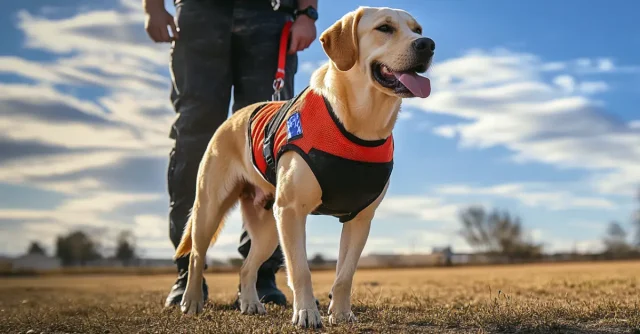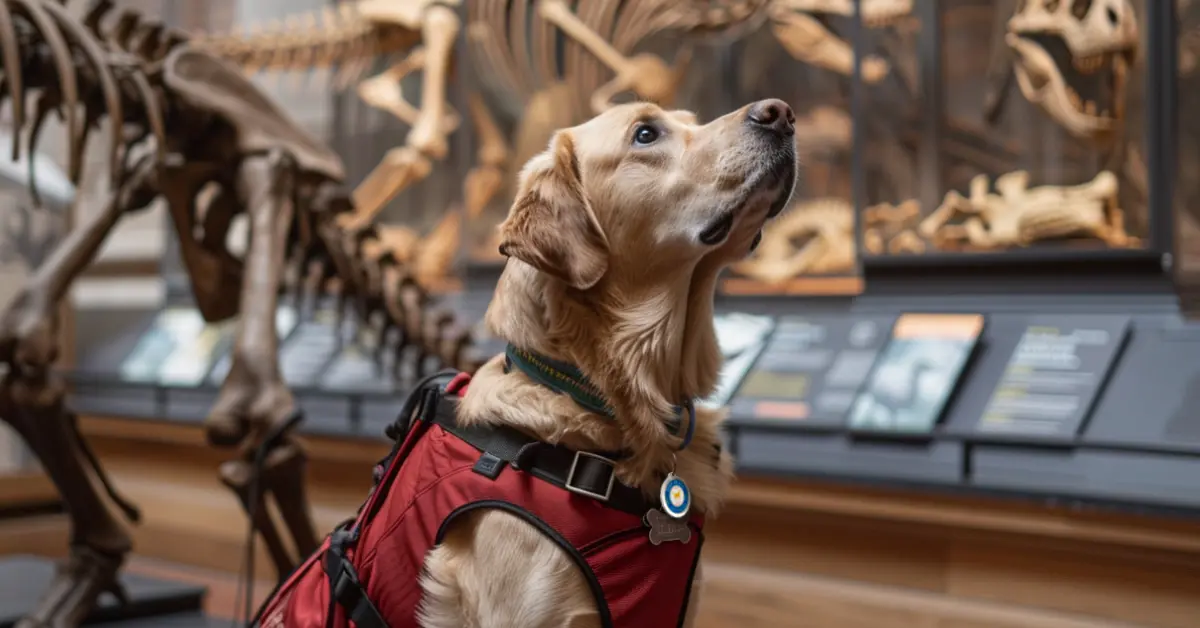How Much Does It Cost to Train a Service Dog

Training a service dog doesn’t have to break the bank! The cost ranges from free (yes, free!) to $50,000, depending on whether you choose self-training ($0 to $7,000), a hybrid approach with professional guidance ($7,000–$15,000), or full professional training ($15,000–$50,000). The price also varies based on your particular disability and the service dog tasks you need.
The good news is that you have multiple training options to fit your budget, timeline, and specific needs. This guide breaks down all the possibilities to give you an idea of what your final bill might be to train a service dog.
In this article:
- Cost of self-training your service dog
- Cost of professional service dog training
- Cost of a hybrid approach to service dog training
- Average cost per service dog skill
- Additional costs to consider
Cost of Self-Training Your Service Dog
Self-training your dog is the cheapest and maybe most rewarding approach. This route typically costs between nothing to $7,000, depending on the state you live in. How could self-training cost nothing? That’s possible if you’re an experienced service dog trainer and you don’t need any outside aids (like if you already have training guides and treats or went through a training program in the past). And yes, ADA service dog laws allow self-training service dogs without outside help.
Typically, however, self-training includes costs like essential training materials, videos, and books ($100–$5,000), task-specific training equipment ($200–$1,000), and treats and rewards for consistent positive reinforcement ($200–$800). Additional costs can include:
- Training clickers and target sticks ($10–$30)
- Travel expenses for public access training ($300–$1,000)
- Specialized harnesses and vests ($80–$300)
- Video recording equipment to review training sessions ($100–$500)
- Scent training materials for medical alert dogs ($50–$300)
- Training seminars and workshops ($200–$2,000)
- Behavioral assessments ($150–$400)
- Professional consultations for specific challenges ($75–$250 per session)
- Health clearances and temperament testing ($200–$800)
The self-training approach works really well for psychiatric service dogs because the training process helps establish a deep bond between the handler and dog to effectively recognize subtle changes in mood and respond appropriately.
Cost of Professional Service Dog Training
If you want to outsource your dog’s training to professionals, you’ll pay between $15,000 and $50,000, but you get a completely trained service animal without the stress of doing it yourself.
Here’s what that price tag actually covers: First, they can help select the perfect dog for your specific needs ($1,000–$3,000) — not every dog has the right temperament for service work! Then they’ll handle all the basic training ($3,000–$6,000) before moving on to the specialized tasks your dog needs to learn to help with your specific disability ($5,000–$30,000). Before you bring your new companion home, they’ll spend time teaching you how to work with your dog ($2,000–$5,000) and make sure everything is properly tested and certified ($500–$1,000).
The big advantage? Trainers have seen it all — they know which training methods work best for different breeds and personalities and have solutions for the challenges that might leave you frustrated for weeks. For busy people or those whose disabilities make training difficult, having experts handle everything can be worth every penny.
Cost of a Hybrid Approach to Service Dog Training
If you’re looking for a middle ground between doing it all yourself and paying for fully professional training, the hybrid approach might be perfect for you. This “best of both worlds” option can cost between $7,000 and $15,000.
Here’s where your money goes: You’ll start with professional consultations to assess your dog and create a training plan ($250–$500). Then you’ll attend group classes led by expert trainers ($30–$80 per class, usually taking 15–30 classes total) and mix in some one-on-one private sessions ($90–$180 per hour for about 10–20 sessions). For the specialized tasks your dog needs to learn for your specific disability, you’ll get expert guidance ($2,000–$5,000), plus all the training gear you’ll need ($500–$1,000).
Why do many people love this option? You get professional help without the premium price tag of full-service training. You’re actively involved in training your dog, which creates an amazing bond between you. And having trainers guide you means you won’t waste weeks going down training dead ends or teaching behaviors incorrectly that you’ll need to fix later. You learn from experts while doing the hands-on work yourself, like having a personal trainer at the gym versus trying to figure everything out from YouTube videos!

Average Cost Per Service Dog Skill
Different service dog tasks require varying levels of training time and expertise. Here’s a breakdown of common skills and their associated estimated training costs if you’re working with a trainer:
| Skill | Training Hours | Average Cost (at $150–$250/hr) |
|---|---|---|
| Basic obedience and public behavior | 30-50 hours | $4,500-$12,500 |
| Retrieval of items | 10-15 hours | $1,500-$3,750 |
| Mobility assistance (bracing, balance) | 20-30 hours | $3,000-$7,500 |
| Medical alert training (seizure, diabetes) | 40-60 hours | $6,000-$15,000 |
| Guide work for visual impairment | 120-200+ hours | $18,000-$50,000 |
| Psychiatric response tasks | 25-40 hours | $3,750-$10,000 |
| Deep pressure therapy | 8-12 hours | $1,200-$3,000 |
| Medication reminders | 5-10 hours | $750-$2,500 |
Basic obedience and public behavior training typically requires 30-50 hours of professional work, costing between $4,500–$12,500 at rates of $150–$250 per hour. Simple task training, like the retrieval of items, needs approximately 10–15 hours, while more complex skills like mobility assistance for bracing and balance support require 20–30 hours.
The more sophisticated medical alert training for conditions like seizure or diabetes detection demands 40–60 hours of specialized training, with costs ranging from $6,000 to $15,000. Psychiatric response tasks typically need 25–40 hours, while comfort-oriented skills like deep pressure therapy might require 8–12 hours. Simpler assistance like medication reminders can be taught in roughly 5–10 hours.
The most intensive training is required for guide work supporting visual impairment, demanding 120–200+ hours of highly specialized instruction and practice, with costs ranging from $18,000–$50,000. This explains why guide dogs are typically among the most expensive service animals to train properly.
Additional Costs to Consider
Don’t forget about the day-to-day expenses of having a service dog. These ongoing costs can add up to $2,000–$5,000 per year, depending on your dog’s size, breed, and specific needs.
Food will run you about $400–$700 yearly (bigger dogs eat more, and premium foods cost more). Vet care is another big expense at $700–$2,000 per year for regular checkups, vaccinations, preventative medications, and the occasional illness. Remember, keeping your service dog in top health isn’t optional — they’re working animals who need to be at their best!
When you first get your service dog, you’ll spend $200–$500 on special equipment like harnesses, ID cards, and service vests. Many handlers also budget $300–$800 yearly for pet insurance (smart move — an unexpected $3,000 surgery could sideline your helper when you need them most). Don’t forget grooming costs of $300–$1,200 yearly — service dogs need to look and smell clean, especially in public places like restaurants and hospitals.
One expense people often overlook: ongoing training! Setting aside some money yearly for “maintenance training” helps keep your dog’s skills sharp and addresses any new challenges. Think of it like tune-ups for your car — regular maintenance prevents bigger problems down the road!
About the Author: The writing team at Service Dog Certifications is made up of folks who really know their stuff when it comes to disability laws and assistance animals. Many of our writers and editors have service dogs themselves and share insights from their own experiences. All of us have a passion for disability rights and animals.
27 comments
Leave a Reply Cancel reply
Latest Posts

Can you bring a service dog to a museum?
Yes, you can bring your service dog to the museum! All the major U.S. museums welcome guests with service animals in accordance with the Americans with Disabilities Act (ADA). There are some areas, however, that might be off-limits. Here’s what you should know if you plan to spend a day at the museum with your […]

Read More

How to Bring a Service Dog to Six Flags Magic Mountain
Service dogs are welcome at Six Flags Magic Mountain so long as they are, according to Six Flags, “trained to do work or perform tasks for people with disabilities.” Of course, your dog must be housebroken and remain on a leash or harness and under your control while at the park — and the park […]

Read More

When Stores Can Refuse Your Service Dog
According to the Americans with Disabilities Act (ADA), service dogs should be allowed into any store most of the time. A store owner can legally exclude a service dog if they are actively growling, snapping at, or frightening customers, or if the dog is obviously out of the control of its owner. Ordinary behaviors — […]

Read More

How much would a service dog cost for a mental illness?
Same I have to get an emotional support dog/animal for depression
How much to train for the deaf
My daughter need service dog and she is has several disability which she use cane and for her birthday I would like to give her a service dog which I thing help her ability’s to walk better and stand
Does anyone know if it’s okay if I myself can train my own dog? I know what I want to train him but will he still be considered a service dog if he doesn’t get professional training?
I myself don’t have the money to get him trained by a professional and it’s stressful because I have severe Anxiety and depression along with other things and he already knows what to do to help me.
He’s a 9 month old black lab mix and for his age he’s very smart and catches on to things very fast. He’s very good around people and he loves children and the elderly. He’s got an amazing personality to him and I just feel like he’d be an amazing dog to train to become a service dog. Unfortunately, like I said, I don’t have the money to get him trained by a professional and I was wondering if he could still be a service dog if I trained him.
Absolutely, your dog can be trained by you, rather than be professionally trained. But keep in mind that a service dog has to be on best behavior, or the restaurant/store/etc. can legally ask you and your dog to leave. A very good starting point would be for you to get yours his/her Canine Good Citizen certification…learn more about that online. Also, google the Americans With Disabilities Act, as it applies to service dogs. There is a tremendous amount of WRONG info out there, being familiar with it will help answer a lot of questions for you. Best luck, Gail
Any help on paying for the training
You can train him yourself. There are no government regulations regarding service dogs. Any dog that is used by an individual with a disability can be called a service dog. The only requirement is that you actually have a disability and the dog is trained to do one task that assists you with your disability. No one is allowed to ask you what your disability is and no one is allowed to ask you to have the dog perform the task they are trained to do for you. There is no test required for the dog to pass and they do not need to have a tag, vest or anything else that shows they are a “service” dog. A lot of people take advantage of this lack of regulations and go around with their dogs to public places and claim that they are necessary for some type of hidden disability which is sad for people who really get benefit from an actual service dog because it makes everyone doubt that any dog is a real service dog. But anyway long story short, you can train your own dog, they do not need to be registered by any agency, facility, program, etc, they can be any breed of dog, and no one is allowed to question if it is an actual service dog or not.
You can owner Tran him just as long you know what the laws are
Other than walking with a cane, does she have other needs?
How old is she?
Where are you located?
This is tooooo much for a low income families.
Exactly I mean I have anxiety and panic disorder along with ADD and I have attacks all the time and I would really do better with a dog. But ofc I can’t bc it is way to much!!
Hey how much does it cost for a service dog for speech therapy
I have a nut allergy and there are nut allergy service dogs now, where do I get one, because I’ve been looking at them, and it looks like I could use one. Can someone help me/
If a person has seizures or panic attacks, can they have their poodle be a service dog? Their doctor gave them that their dog be considered service dog. The dog is 2 years old, house trained, very affectionate… The person I know doesn,t go out without their dog for walks….do they need to register and have their dog trained?
A friend
Training is what makes their dog become a service dog. That includes task-based training for where the dog would master specific tasks (like alert the person of an upcoming seizure attack, or fetch medication) and a public access test where they must learn to stay focused on the handler’s need absolute any public setting. Once the dog has completed the training, it becomes a service dog. Registration is not required by law but gives some service dog owners additional comfort when confronted by others. Your friend may find this article on how to make a dog become a service dog interesting https://www.servicedogcertifications.org/how-to-make-my-dog-a-service-dog/
Why would anyone pay? If you truly have a disability and have the medical history to prove it you can get a trained dog for free.
Because the waiting list is about 2 years or more
Anyone know how much it would be for a dog that helps with seizures? My old dog could detect them without training and she passed away a year ago. Iv been having a hard time with my seizure since then
I have a golden doodle that I want to train as a PTSD service dog is this breed accessible as a service dog. B
When it comes to service dogs there are no breed limitations, as long as the dog is capable of being properly trained.
I have a chihuahua he has alerting my sister when her blood sugar is low,He sticks to her like velcro.Then she checks her blood sugar. sure enough she tanks out .and I have had a stroke, He alerts me too. So here is what I found out… He has a bad temper, to strangers, he minds when he wants too, stubborn he bites other people. Goes after other dogs, Is there a class I can take to help Nacho and his protective ways? Oh we got hims at the animal shelter. We really love him. He does have good qualities. But I would love it if I could get him registered as a alert dog. Can you help with giving a good dog trainer? We live in Spring Texas. Please ! Help
We do not provide training services, but a dog that acts aggressively towards other people cannot become a service dog. A service dog must be under the handler’s control at all times in public places. They can never bite or lunge at other people or animals. Registering a dog also does not automatically make them a service dog – registration is an optional step for handlers who have fully qualified service dogs.
I have a question regarding my dog, whom I consider a service dog for my particular disabilities. Unfortunately, I am not able to afford the training and certification. My new “landlord” is insisting I get rid of my dog. I have had numerous surgeries on my legs and feet. I have problems with balance and have fallen on several occasions. I have taught my bulldog to brace himself so that I am able to use his body as an aid to get to my feet. He has also learned to “help me up”if I take hold of his harness. I have a letter from a nurse that works with me throughout the month. I did license or register him with one of the websites that claim their certifications are enforceable. I only recently found out this is false. I am at a loss as to what to do. Do you have any suggestions? I have been in this mobile home park working with clients as a caregiver. My mom lives in this park and I will be moving in with her due to her age and dementia. I have NEVER had a complaint. The manager has never said a word to me about my dog until recently. Now she is on a mission to either remove my dog or have us both leave. It’s completely baffling. The only person who would truly suffer is my mom.
I am at a loss.
You should be aware that the ADA allows service dog owners to train their dogs themselves. You also do not need any type of certification for a service dog – that is completely optional. There are many lower-income service dog owners who can not afford professional training services or pre-trained service dogs. If you have a qualifying disability, you may want to look into training your dog yourself, perhaps with the help and input of a professional trainer who can offer some assistance.